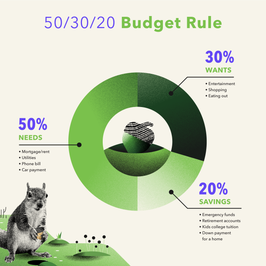How to Create a Budget: 3 Tips

Having trouble staying on top of your money? It turns out only 41 percent of Americans follow an actual budget, according to 2016 research from U.S. Bank. The rest are flying blind, financially speaking.
Some good news: whipping up an effective budget is surprisingly simple. Manage your spending, boost your savings and budget like a boss with these easy action items.
Iron out your income and expenses.
There are two building blocks to any successful budget: your income and your expenses. The first is pretty straightforward. How much are you bringing home every month? Consider all sources of reliable income, from your regular job to any steady side hustles and passive income streams. If you're dealing with irregular income that fluctuates from month to month, estimate your take-home conservatively to give yourself some breathing room.
Now take a look at how much money goes out each month. Think about fixed expenses (i.e. basic bills you can't get around paying, like your rent and car payment), as well as non-essential spending. Identifying the latter may require some sleuthing. Browse through your bank statements to get a feel for where your hard-earned cash is going every month.
When tracking your spending, go back at least a few months to get the most realistic snapshot of your spending habits. Things like subscription services, eating out and impulse shopping should all be on your radar.
Putting a magnifying glass on your spending habits will reveal which categories are taking the biggest bite out of your income—things like entertainment, food, clothes and so on. Pay attention to these spending areas; they'll come in handy when it's time to shape a personalized budget.
It shouldn't take long to pinpoint expenses you can negotiate down or eliminate altogether. Cable and internet services are a great place to start. Your credit card interest rates may also be on the table. One 2018 CreditCards.com survey found that 70 percent of cardholders were able to reduce or eliminate annual fees simply by asking for it—and 56 percent who asked got a lower interest rate (or APR).
Play the long game.
Your budget isn't a rigid, static thing. Stay open to adjusting and course-correcting as you move through different phases of your life. This has everything to do with your long-term financial goals. Whether it's buying a house or backpacking through Southeast Asia, we've all got bucket-list dreams that won't materialize without some intention and cash flow. An effective budget is one that accounts for these big-ticket, down-the-road goals. (More on how to save for them in a minute.)
Speaking of goals, if you haven't already built up an emergency fund, begin where you are and settle on an amount you can reasonably funnel into your savings account each month: $1,000 is a good starting goal. Experts recommend boosting this fund up to about three to six months' worth of living expenses. But don't worry if you've got a ways to go here. What matters most is that you get in the habit of automatically saving a portion of your take-home pay. It helps to make it a line item on your budget and to treat it like any other regular bill.
No matter what other financial goals you're working towards, retirement should be your radar. Compound interest is a serious wealth-builder, so the sooner you can prioritize investing, the better. Try our compound interest calculator to see for yourself! An employer-backed 401(k) is a great jumping-off point, especially if you can snag any sort of free match on your contributions. You can also check out IRAs, or Individual Retirement Accounts, which come with some serious tax perks. And look at regular brokerage accounts for the goals you have in the decades before retirement. (Acorns offers a regular brokerage account as well as IRAs.)
Successful long-term investors often steer away from trying to time the market and win big with individual stock picks. Instead, low-risk investment options like low-cost index funds and exchange-traded funds (ETFs) are where it's at. Buying shares in those funds provides exposure to a wide range of stocks or bonds, making it easier to diversify your portfolio and manage your risk. (Acorns portfolios are composed of ETFs with exposure to thousands of stocks and bonds.)
Fine-tune your budgeting plan.
You're crystal clear on your income, have eliminated wasteful spending, and pinpointed your big-picture money goals—good on you! Next, think about the best approach for your financial game plan. Budgets come in all different shapes and sizes, meaning you have options when it comes to settling on a plan that gels best with your personality and lifestyle.
If you prefer a concrete plan of action to help rein in the urge to overspend, the 50/20/30 budget might be a good fit. It breaks down your take-home pay like this:
50 percent for needs
These are regular, non-negotiable bills like housing, electricity and the like. Minimum debt payments go in this bucket, too.
20 percent for money goals
Remember those long-term goals? These go here. Part of the reason this budgeting method rocks is that it allows you to save for multiple goals at once.
30 percent for wants
Yep, you read that right. A third of your income can be set aside for entertainment, eating out, a spa day...basically treating yourself, whatever that looks like. It may feel counterintuitive to splurge on yourself when trying to be financially responsible, but the truth is that if you go too lean with your budget, it's only a matter of time before you cave in and overspend. That said, if you discover you're currently spending more than 30 percent of your pay on this category, take a Marie Kondo-like approach to bringing that number down: discretionary spending is only for things and experiences that spark real joy.
Those who find the 50/20/30 budget too rigid might be more attracted to flexible budgeting. This is when you set up automatic payments for all your regular bills and savings goals—set it and forget it. Any leftover money can be spent however you like. Just be careful not to overdraw your account in between pay days.
When all is said and done, understanding your personality type goes a long way in building a budget that actually works. The same goes for getting real about your income, expenses and typical spending habits. From there, you'll have the budgeting basics down and can hit the ground running.
This material has been presented for informational and educational purposes only. The views expressed in the articles above are generalized and may not be appropriate for all investors. The information contained in this article should not be construed as, and may not be used in connection with, an offer to sell, or a solicitation of an offer to buy or hold, an interest in any security or investment product. There is no guarantee that past performance will recur or result in a positive outcome. Carefully consider your financial situation, including investment objective, time horizon, risk tolerance, and fees prior to making any investment decisions. No level of diversification or asset allocation can ensure profits or guarantee against losses. Article contributors are not affiliated with Acorns Advisers, LLC. and do not provide investment advice to Acorns’ clients. Acorns is not engaged in rendering tax, legal or accounting advice. Please consult a qualified professional for this type of service.








